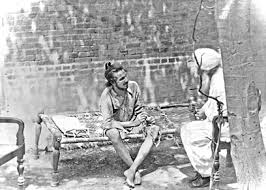
In 1929, Bhagat Singh and his fellow revolutionaries undertook a historic 116-day hunger strike while imprisoned in the Lahore Central Jail. This strike was not just an act of defiance but a powerful statement against the inhumane treatment of Indian political prisoners by British authorities.
1. The Reason Behind the Hunger Strike
Indian prisoners were subjected to harsh and discriminatory conditions in British jails, while British prisoners received better food, clothing, and treatment. Bhagat Singh and his comrades demanded:
- Equal treatment for Indian and British prisoners.
- Better food, hygiene, and living conditions.
- Access to books, newspapers, and writing materials.
- The status of political prisoners, rather than common criminals.
2. The Start of the Hunger Strike (June 1929)
Bhagat Singh, along with Jatin Das, Dutt, Rajguru, Sukhdev, and others, refused to eat solid food and survived only on water mixed with salt for over three months.
3. Jatin Das’ Martyrdom
- The hunger strike took a tragic turn when Jatin Das died on the 63rd day (September 13, 1929) due to extreme weakness.
- His death intensified public outrage against British rule, and his funeral in Kolkata drew massive crowds.
4. Bhagat Singh’s Determination
Despite extreme weakness, Bhagat Singh continued the strike for 116 days. His weight dropped drastically, and his health deteriorated, but he refused to give in.
- Even while fasting, he continued reading books, writing letters, and studying revolutionary ideas.
- He famously wrote, “Revolution is an inalienable right of mankind.”
5. The British Response
- The British authorities tried to force-feed the prisoners, but they resisted.
- Due to increasing public pressure and protests across India, the British were eventually forced to improve prison conditions.
6. End of the Hunger Strike
- The hunger strike ended on October 5, 1929, after some demands were met.
- Bhagat Singh emerged as a national hero, symbolizing sacrifice, courage, and resistance.
Impact of the Hunger Strike
- It exposed British cruelty and gained massive public support for the freedom movement.
- It inspired future revolutionaries to continue fighting for justice.
- It showed the world that non-violent resistance could be as powerful as armed struggle.
Bhagat Singh’s 116-day hunger strike remains one of the longest and most impactful hunger strikes in history, proving his unyielding commitment to justice and equality.